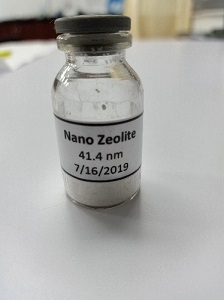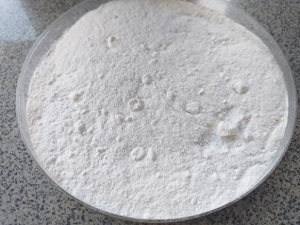 To aid problems caused by aquaculture operation, a technology called Zeolite-Silica Nanocomposite (ZNC), which can be used as soil and water conditioner for aquaculture, was developed.
To aid problems caused by aquaculture operation, a technology called Zeolite-Silica Nanocomposite (ZNC), which can be used as soil and water conditioner for aquaculture, was developed.
ZNC is a novel material synthesized and fully characterized at the Central Luzon State University (CLSU)-Nanotechnology R&D Facility. It is effective in purifying intensified pond water due to its enhanced properties such as 262 m2 /g (surface area), smooth surface morphology, diameter size 38.26±8.32 nm, and amorphous. It is slightly soluble, and is crucial to retain this amorphous quality to enable a sustainable energy system based on the recycling of water in the ponds.
ZNC was developed through the funding of the Philippine Council for Agriculture, Aquatic and Natural Resources Research and Development of the Department of Science and Technology (DOST-PCAARRD) and the implementing agency, CLSU through the leadership of Dr. Juvy J. Monserate, project leader from CLSU.
The Nano (zeolites and silica) composite technology improves the water quality and soil conditions for tilapia production through the use of modified nanoactivated carbon and nanoclay clinoptholite and provides environment-friendly approach to solve the problems in intensive aquaculture operations. Nano-char (nano-silica) and nano zeolite composites reduces ammonia-nitrogen and total dissolved solids (TDS) in contaminated water. Other possible benefits of the technology include reuse or recycling of water after harvests, thus, reducing the pressure towards the groundwater resulting in healthier fish and higher income to fish farmer.
 It is hoped that further research study will be conducted to include more water quality parameters such as alkalinity, water hardness, and phosphate assessment, as well as experiments to detect significance between treatments to the overall health and behavior of Nile Tilapia upon interaction with the nano zeolite-silica composite. The results of the study could be a baseline for other studies, which would focus more on nano zeolite-silica composite in water treatments and other nanotechnologies that would be very useful in aquaculture that will benefit the fish farmers, researchers, extension workers, educators and students.
It is hoped that further research study will be conducted to include more water quality parameters such as alkalinity, water hardness, and phosphate assessment, as well as experiments to detect significance between treatments to the overall health and behavior of Nile Tilapia upon interaction with the nano zeolite-silica composite. The results of the study could be a baseline for other studies, which would focus more on nano zeolite-silica composite in water treatments and other nanotechnologies that would be very useful in aquaculture that will benefit the fish farmers, researchers, extension workers, educators and students.
Tilapia is the second most cultured fish species in the Philippines next to milkfish. It is easy to breed and is a high-yielding aquaculture commodity. However, tilapia culture is facing challenges such as the conversion of agri-fishery areas to residential and industrial use; water use dispute between aquaculture and agriculture, and water pollution.
